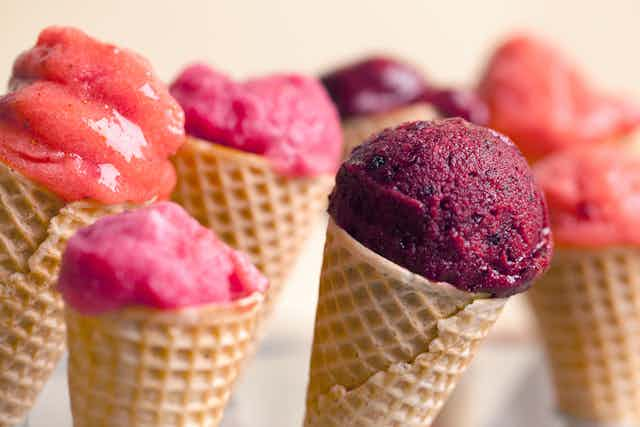The Office for National Statistics has produced a report on sales of popular summer-related products. Official data on sales of goods are limited in that they tend to be based on annual spending, but clearly the demand for some products tends to be seasonal. Various cold drinks, meat (for barbecues) and ice cream are identified as typical examples.
While we do not have official data on the extent to which demand for these goods varies over the year, unofficial data allow us to learn a little more about the extent to which a good (or a bad) summer can affect demand.
A major UK ice cream producer reports that some 68% of its revenue is earned in the second and third quarters of the year. Using this figure alongside typical monthly temperatures in the UK allows us to establish that a 1% increase in temperature results in a 1.2% rise in the demand for ice cream. An August in which temperatures are one degree hotter than usual therefore likely results in a 6% increase in ice cream sales during that month.

Data from Information Resources Inc compare UK demand for cold alcoholic drinks in the two week period to July 20 2013 with that of the corresponding period in the previous year. Data on temperatures near the geographic centre of the UK for these periods indicate that, in 2013, the average was 20.6°C, while in 2012 it was just 15.7°C.

Of course, other factors – especially economic factors – are likely to affect demand too. Abstracting from these, however, a 1% increase in temperature seems to be associated with an increase in demand of around 2.4%. An August in which temperatures are 1°C hotter than usual would therefore lead to an increase in demand of around 12%. This should be regarded as an upper bound in view of the fact that some of the increase in demand between 2012 and 2013 might have been due to changes in general economic conditions rather than changes in temperature.
The analysis of seasonal effects is particularly difficult in the case of meat, not least because different types of meat are popular at different times of the year. The demand for sirloin may be relatively high in the summer, but the demand for roasting joints is relatively low at that time of year. Overall, statistics on meat production do not indicate any substantial increase in the summer – indeed the peaks for sheep and pig meat come later in the year.
Other types of summer-related goods include garden furniture, barbecues and air conditioners. But since these are durable goods, consumers benefit from them over the course of several summers, some of which will be hotter than others. We would expect people to average out across several years their likely use of these products, and so purchases of such goods should not be unduly sensitive to a heatwave in any one year.
Evaluating the economic impact of summer has much in common with attempts to measure the effects of major events. Typically the expenditure that is associated with an event (be it the Olympics or a heatwave) is diverted rather than created – and it matters where it is diverted from and where it is diverted to. If we spend more on beer but less on coffee, the aggregate effect on the UK economy is likely to be small. If, however, we spend more on domestic holidays and less on going abroad to chase the sun, the economy will benefit.
As the above figures indicate, for the producers of at least some summer-related goods, a good summer can be good in more senses than one. But an important catch in all of this is that much of the increased expenditure on summer related products is mirrored by decreased spending on other things.
For every ice cream that is eaten, a hot chocolate may be eschewed. So – tempting as it might be to try and calculate a figure for the economic value of a hot summer – adding up extra sales revenues for these products is not really a particularly instructive exercise. Indeed, the true value of a summer is most likely captured by the feelgood factor that a little sunshine brings, so enjoy it while you can.

